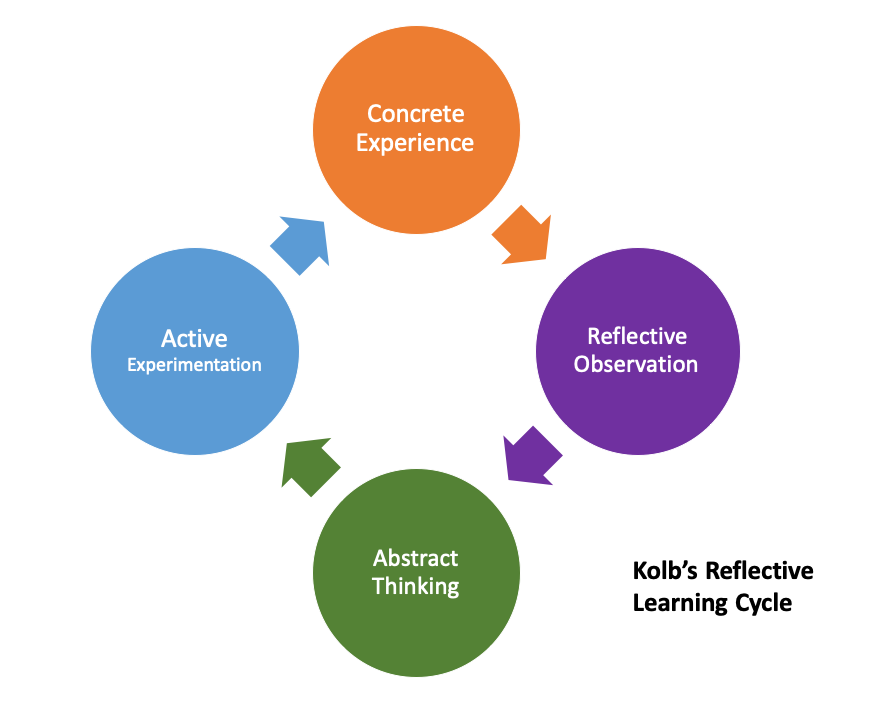8 Identify the characteristics of reflective writing
On your Personal Learning/Reflection on the Course page, you are asked to provide some reflection on your most valuable learnings, through the lens of your own experience or actual workplace situations. Reflection is a key skill for ongoing professional development as it facilitates learning through workplace experiences. The most successful professionals are often those who have mastered the skill of ongoing personal development through reflection.
The video below introduces you to the meaning of reflection for learning.
Reflection and professional learning:
In workplace learning, professional growth is often pictured as an interaction between experiences, your reflection on these experiences, and the new action you take in response.

One model of this type of learning is Kolb’s reflective learning cycle. It begins with an experience in your workplace or personal life. After the experience, you observe yourself — your feelings, thoughts, and actions — as you make sense of the experience and seek insight. Then, in the abstract thinking stage, you apply your knowledge to the situation, developing a theory that explains your experience and how you might want to proceed in the future. Finally, you test your theory by trying out new approaches based on your reflection.
Part of the work of your ePortfolio assignment is to demonstrate your skills at this type of professional learning and growth. You are combining action, reflection, and theory to shape your ongoing learning and development. The questions below can guide you through the process of reflection in an academic context.
Questions for guided reflection:
- Think of an interaction, event, or episode you experienced. Describe what happened.
- What feelings and perceptions surrounded the experience? How would you explain these to someone else?
- What does this experience mean in the context of your course?
- What other perspectives, theories, or concepts could be applied to the situation?
- How does the experience impact your present and future actions?
Develop a reflection
Identify one concept you have learned in your first weeks of the Employment Law course. Answer the five questions above. How would you use your answers to create a personal reflection for your ePortfolio.
Analyze a reflection
Ongoing employment: Duty to accommodate
During this section of the course, understanding the duty to accommodate was particularly interesting in light of my personal interests and ongoing professional goals. Prior to my study of human resources, I was employed by an educational centre for children and youth with autism. One of the key concerns expressed by instructors and parents was securing opportunities for capable young adults to access meaningful and relevant employment. Because the needs and behaviours of individuals with autism are often not well-understood by employers, their opportunities to participate in meaningful employment are limited.
Accommodation in the workplace seeks to create “inclusive environments that respect the differences and the rights of a diverse society” (Community Legal Assistance Society, 2016). Thus, rather than being viewed as a burden, the duty to accommodate should be viewed as a means of allowing all individuals to contribute to the workplace and the broader society using their skills and training. Those unaccustomed to interacting with individuals on the autism spectrum often assume that these individuals have a lower level of ability than may actually be the case because of their difficulties with social communication and unique behaviours in response to sensory stimuli. However, individuals on the autism spectrum may possess normal to high intelligence, along with particular strengths. These contributions can provide significant benefit to employers.
The duty to accommodate requires respecting the dignity of the individual while responding to their needs. In the case of individuals on the autism spectrum, this requires treating them as full adults, while respecting needs for alternative methods of communication or modifications to the workplace environment to reduce unnecessary sensory stimuli. Accommodation of diverse individuals requires that their work be respected, and that they be treated as full members of the workplace team.
In my experience, I have observed that employers often assume that accommodating individuals on the autism spectrum would cause an undue burden. However, as I’ve grown to understand more about the duty to accommodate, I now understand it as intended to enhance the workplace, rather than to burden the employer. As an emerging HR professional, I see opportunities to use this new knowledge to advocate for a positive view of how accommodating individuals with diverse abilities can enhance workplaces and teams. I also see that the role of HR professional includes working with the company to facilitate the diversity and inclusion that the duty to accommodate supports. I plan to seek out ways to positively frame this requirement so that the companies I work for view it as an opportunity, rather than a burden.
Community Legal Assistance Society. (2016). Duty to accommodate. Retrieved May 22, 2019, from https://www.bchrc.net/duty_to_accommodate
Reflection analysis
- How does the above reflection demonstrate the author’s personal experience?
- How does the author integrate course concepts into the reflection? In what ways is it clear that the author applies course concepts as she thinks through a situation from her own experience?
- In what ways does the author indicate present and future actions that arise from reflection?
Content in this section adapted from: University of New South Wales. (n.d.). How Do I Write Reflectively? Retrieved October 26, 2017, from https://student.unsw.edu.au/how-do-i-write-reflectiveln1. y

